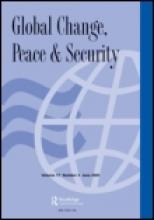Human Rights, Cultural Diversity and Conflict Resolution: the Asia-Pacific Context
Joseph A. Camilleri, ‘Human Rights, Cultural Diversity and Conflict Resolution: the Asia-Pacific Context’, Pacifica Review, Vol. 6, No. 2, 1994, pp. 17-41.

A discussion of the competing claims of universalism and cultural relativism suggests that the two conceptions may not be as contradictory as is often assumed. A dialogue between quite distinct religious or ethical traditions can yield universal standards, so long as it is understood that the universal is not immutable or absolute, but that it is the evolving outcome of negotiation based as much on complementarity as on commonality.
The analysis focuses on four traditions (Hinduism, Buddhism, Confucianism, Islam) which have exercised a significant influence over the Asian cultural and political landscape. It suggests important areas of common ground with the Western tradition, particularly in relation to such notions as ‘the dignity of human life’, ‘human fulfilment’ and ‘standards of lightness in human conduct’. On the other hand, the integration of Asian perspectives allows for a more comprehensive view of human rights, and for closer connections between human rights and human needs, between rights and obligations, and between the individual and the community. Placed in this context, cultural diversity offers an unusually favourable environment for conflict resolution and the establishment of a more effective regional human rights regime.
